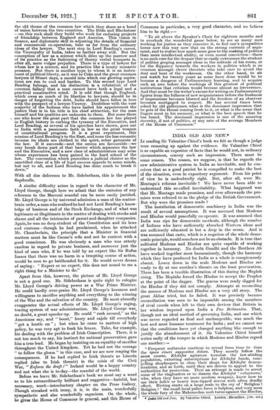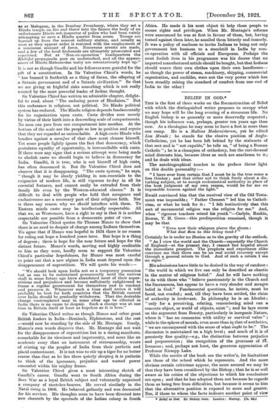INDIA OLD AND NEW.* IN reading Sir Valentine Chirol's book
we felt as though a judge were summing up against the evidence. Sir Valentine Chirol is so capable an expositor of facts that he would not, in ordinary circumstances, convey such an impression. There must be some reason. The reason, we suppose, is that he regards the new administrative system in India as inevitable, and he con- ceives that as a good patriot he is compelled to make the best of the situation, even in expository argument. From his point of view he is undoubtedly right. But, after all, were Mr. Montagu's reforms inevitable ? We have never been able to understand this so-called inevitability. What happened was that Mr. Montagu made promises, and ever afterwards the pro-
mises were referred to as the pledge of the British Government. But why were the promises made ?
The installation of democratic machinery in India was the result of several assumptions. It was assumed that Moslems and Hindus would peacefully co-operate. It was assumed that India was ripe for democratic methods, although the number of Indians who have sufficiently absorbed Western ideas and
are sufficiently educated is but a drop in the ocean. And it was assumed that caste, which is a negation of the whole demo- cratic principle, would somehow not be an obstacle. It is true that cultivated Moslems and Hindus are quite capable of working together in harmony. No doubt Gandhi and the Brothers Ali have worked together most harmoniously, though the harmony which they have produced for India as a whole is conspicuously
absent. Lower down in the scale Moslems and Hindus are ready to fly at one another's throats on the least provocation.
There has been a terrible illustration of this during the Moplah rising. The Moplahs forced the Hindus to accept the Prophet at the point of the dagger. The graves were ready digged for the Hindus if they did not comply. Attempts at reconciling the masses of Moslems and Hindus are a very old story. The great Akbar tried, but he failed. It was precisely because reconciliation was seen to be impossible among the members of rival creeds when left to their own devices that Britain in her wisdom imposed upon India a Pax Britannica. That, though not an ideal method of governing India, and one which was never regarded as final and unchangeable, was much the best and most humane treatment for India ; and we cannot see that the conditions have yet changed anything like enough to justify the abandonment of it. Sir Valentine Chirol himself writes sadly of the temper in which Moslems and-Hindus regard one another:— "Frequent outbreaks continue to reveal from time to time the ignee cineri support:toe doloeo. They. mostly. follow the same course. Khilafat agitators terrorise the law-abiding population, extorting subscriptions for Khilafat funds, com- pelling shopkeepers to close their shops for Khilafat demon- strations, and so forth, until they are driven to appeal to the authorities for protection. Then an attempt is made to arrest some of the ringleaders or to disarm the Khilafat volunteers,' who, when they have no more modern weapons, know how to use their lathia or heavy iron-tipped staves with often deadly effect. Rioting starts on a large scale to the cry of Religion 1 Religion l' the small local police force is helpless, and very soon the whole fury of the Mahomedan mob turns against the Hindus, • India Old and Yew. By Valentine Chirol. London:Macmillan. flea, net.)
as at Malegaon, in the Bombay Presidenoy, where they set a Hindu temple on fire and threw into the flames the body of an unfortunate Hindu sub-inspector of police who had been vainly sttempting to save a Hindu quarter from arson. Troops are 'hurried up from the nearest military station, and usually as soon as they appear order is restored with the employment of a minimum amount of force. Numerous arrests are made, and a few of the loyal firebrands are ultimately prosecuted and convicted. But at ` Non-co-operation ' headquarters the Khilafat propaganda goes on undisturbed, and all the appear- ances of Hindu-Mahomedan unity are ostentatiously kept up."
It is not as though Gandhi and his followers were grateful for the gift of a constitution. In Sir Valentine Chirol's words, he has banned' it forthwith as a thing of Satan, the offspring of a Satanic government and of a Satanic civilization." So that we are giving at frightful risks something which is not really wanted by the most powerful leader of Indian thought.
Sir Valentine Chirol has written an admirable chapter, delight- ful to read, about " The enduring power of Hinduism." But this endurance is religious, not political. No Hindu political system has endured. The Hindu religion depends fundamentally for its organization upon caste. Caste divides men merely by virtue of their birth into a descending scale of compartments. No man can pass from one compartment into another. At the bottom of the scale are the people so low in position and repute that they are regarded as untouchable. A high-caste Hindu who brushes against a metis'ier of that class must cleanse himself. Yet some people lightly ignore the fact that democracy, which postulates equality of opportunity, is irreconcilable with caste. If there were any signs that a serious attempt were being made to abolish caste we should begin to believe in democracy for India. Gandhi, it is true, who is not himself of high caste, has often denounced it. But Sir Valentine Chirol does not observe that it is disappearing. " The caste system," ho says,
" though it may be slowly yielding in non-essentials to the exigencies of modem life, is still vigorous to-day in all its essential features, and cannot easily be extruded from their family life even by the Western-educated classes." It is difficult to deal with people who hold that arrogance and exclusiveness are a necessary part of their religious faith. Nor is there any reason why we should interfere with them. To Eastern minds caste may be intellectually respectable. All that we, as Westerners, have a right to say is that it is neither
respectable nor possible from a democratie point of view.
Sir Valentine Chirol quotes Sir Thomas Munro to show that there is no need to despair of change among Indians themselves. We agree that if Munro was hopeful in 1824 there is no reason for ruling out hope a hundred years later. But hope is a thing of degrees ; there is hope for the near future and hope for the distant future. Munro's words, moving and highly creditable to him as they were, hardly seem to support Sir Valentine Chirol's particular hopefulness, for Munro was most careful to point out that a new regime in India must depend upon the disappearance of superstition. We will quote his words :— " We should look upon India not as a temporary possession but as one to be maintained permanently until the natives shall in some future ago have abandoned most of their super- stitions and prejudices and become sufficiently enlightened to frame a regular government for themselves and to conduct and preserve it. Whenever such a time shall arrive it will probably be best for both countries that the British control over India should be gradually withdrawn. That the desirable change contemplated may in some after age be effected in India there is no cause to despair. Such a change was at one time in Britain itself at least as hopeless as it is here."
Sir Valentine Chirol writes as though Munro and other great British leaders in India—Bentinck, Elphinstone, and the rest —would now be standing by the side of Mr. Montagu. Surely, .Mumsi's own words disprove that. Mr. Montagu did not wait for the disappearance of superstition but in a daring manifesto, remarkable for its viewiness and impetuosity, and more like an academic essay than an instrument of statesmanship, wrote of stirring up the peoples of India from their pathetic and placid contentment. It is not wise to stir up a tiger for no better reason than that as ho lies there quietly sleeping it .is pathetic to think of the ignorance, prejudice and wasted power concealed within his mighty frame.
Sir Valentine Chirol gives a most interesting sketch of Gandhi's career. Gandhi went to South Africa during the Boer War as a loyal British subject and voluntarily organized a company of stretcher-bearers. He served similarly in the Natal rising in 1906. He behaved gallantly and was decorated for his services. His thoughts seem to have been Iiirected into new channels by the spectacle of the Indian colony in South Africa. He made it his next object to help these people to secure rights and privileges. When Mr. Montagu's reforms were announced he was at first in favour of them, but, having turned against them later, he assailed them bitterly and insanely. It was a policy of madness to invite Indians to bring not only government but business to a standstill in India by non- co-operation with all officials and Europeans. Perhaps the most foolish item in his programme was his decree that no imported manufactured article should be bought, but that Indians should weave their own clothes upon their own handlooms- as though the power of steam, machinery, shipping, commercial organization, and suchlike, were not the very power which has been steadily raising the standard of comfort from one end of India to the other!



































 Previous page
Previous page